

Zeus. Name The Chariot of Zeus, from an 1879 Stories from the Greek Tragedians by Alfred Church.
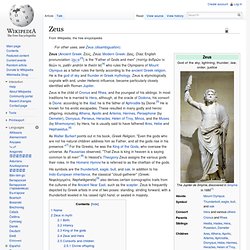
The god's name in the nominative is Ζεύς Zeús /zdeús/. It is inflected as follows: vocative: Ζεῦ / Zeû; accusative: Δία / Día; genitive: Διός / Diós; dative: Διί / Dií. Ares. Ares (Ancient Greek: Ἄρης [árɛːs], Modern Greek: Άρης [ˈaris]) is the Greek god of war.
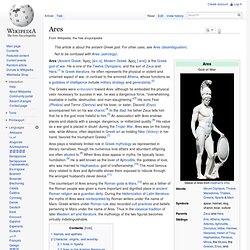
He is one of the Twelve Olympians, and the son of Zeus and Hera.[1] In Greek literature, he often represents the physical or violent and untamed aspect of war, in contrast to the armored Athena, whose functions as a goddess of intelligence include military strategy and generalship.[2] Ares plays a relatively limited role in Greek mythology as represented in literary narratives, though his numerous love affairs and abundant offspring are often alluded to.[8] When Ares does appear in myths, he typically faces humiliation.[9] He is well known as the lover of Aphrodite, the goddess of love, who was married to Hephaestus, god of craftsmanship.[10] The most famous story related to Ares and Aphrodite shows them exposed to ridicule through the wronged husband's clever device.[11] Poseidon. There is a Homeric hymn to Poseidon, who was the protector of many Hellenic cities, although he lost the contest for Athens to Athena.
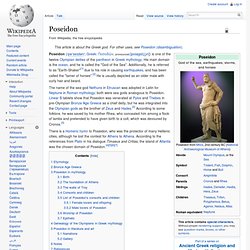
According to the references from Plato in his dialogue Timaeus and Critias, the island of Atlantis was the chosen domain of Poseidon.[4][5][6][7] Etymology The earliest attested occurrence of the name, written in Linear B, is 𐀡𐀮𐀆𐀃 Po-se-da-o or 𐀡𐀮𐀆𐀺𐀚 Po-se-da-wo-ne, which correspond to Poseidaōn and Poseidawonos in Mycenean Greek; in Homeric Greek it appears as Ποσειδάων (Poseidaōn); in Aeolic as Ποτειδάων (Poteidaōn); and in Doric as Ποτειδάν (Poteidan), Ποτειδάων (Poteidaōn), and Ποτειδᾶς (Poteidas).[8] A common epithet of Poseidon is Γαιήοχος Gaiēochos, "Earth-shaker," an epithet which is also identified in Linear B tablets.
Another attested word 𐀁𐀚𐀯𐀅𐀃𐀚, E-ne-si-da-o-ne,[9][10] recalls his later epithets Ennosidas and Ennosigaios indicating the chthonic nature of Poseidon.[11] The origins of the name "Poseidon" are unclear. Birth. Hermes. Hermes is a god of transitions and boundaries.
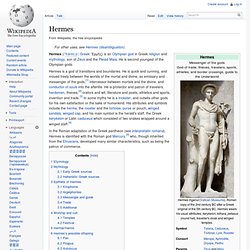
Apollo. Apollo (Attic, Ionic, and Homeric Greek: Ἀπόλλων, Apollōn (GEN Ἀπόλλωνος); Doric: Ἀπέλλων, Apellōn; Arcadocypriot: Ἀπείλων, Apeilōn; Aeolic: Ἄπλουν, Aploun; Latin: Apollō) is one of the most important and complex of the Olympian deities in classical Greek and Roman religion and Greek and Roman mythology.
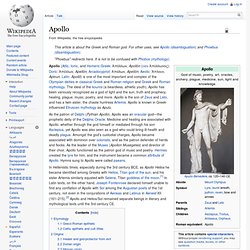
Dionysus. The earliest cult images of Dionysus show a mature male, bearded and robed.
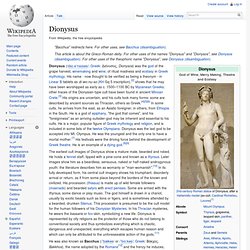
He holds a fennel staff, tipped with a pine-cone and known as a thyrsus. Later images show him as a beardless, sensuous, naked or half-naked androgynous youth: the literature describes him as womanly or "man-womanish".[10] In its fully developed form, his central cult imagery shows his triumphant, disorderly arrival or return, as if from some place beyond the borders of the known and civilized. His procession (thiasus) is made up of wild female followers (maenads) and bearded satyrs with erect penises. Some are armed with the thyrsus, some dance or play music. The god himself is drawn in a chariot, usually by exotic beasts such as lions or tigers, and is sometimes attended by a bearded, drunken Silenus.
He was also known as Bacchus (/ˈbækəs/ or /ˈbɑːkəs/; Greek: Βάκχος, Bakkhos), the name adopted by the Romans[12] and the frenzy he induces, bakkheia. Names Etymology Epithets Acroreites at Sicyon.[24] Mythology. Hephaestus. As a smithing god, Hephaestus made all the weapons of the gods in Olympus.
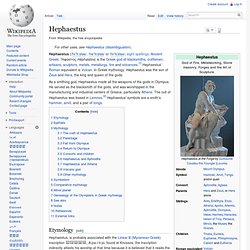
He served as the blacksmith of the gods, and was worshipped in the manufacturing and industrial centers of Greece, particularly Athens. The cult of Hephaestus was based in Lemnos.[2] Hephaestus' symbols are a smith's hammer, anvil, and a pair of tongs. Etymology[edit] Hephaestus, is probably associated with the Linear B (Mycenean Greek) inscription 𐀀𐀞𐀂𐀴𐀍, A-pa-i-ti-jo, found at Knossos; the inscription indirectly attests his worship at that time because it is believed that it reads the theophoric name Haphaistios or Haphaistion.[3][4][5] The name of the god in Greek (Hēphaistos), has a root which can be observed in names of places, of Pre-Greek origin.[6] Epithets[edit] Hephaestus is given many epithets. Mythology[edit]